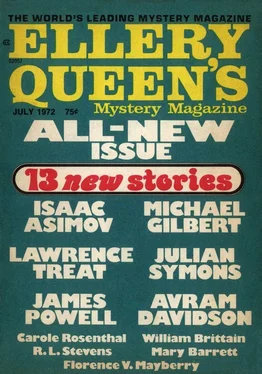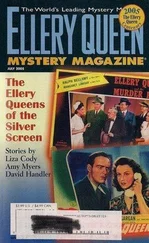Ellery Queen’s Mystery Magazine, Vol. 60, No. 1. Whole No. 344, July 1972
Здесь есть возможность читать онлайн «Ellery Queen’s Mystery Magazine, Vol. 60, No. 1. Whole No. 344, July 1972» весь текст электронной книги совершенно бесплатно (целиком полную версию без сокращений). В некоторых случаях можно слушать аудио, скачать через торрент в формате fb2 и присутствует краткое содержание. Город: New York, Год выпуска: 1972, Издательство: Davis Publications, Жанр: Классический детектив, на английском языке. Описание произведения, (предисловие) а так же отзывы посетителей доступны на портале библиотеки ЛибКат.
- Название:Ellery Queen’s Mystery Magazine, Vol. 60, No. 1. Whole No. 344, July 1972
- Автор:
- Издательство:Davis Publications
- Жанр:
- Год:1972
- Город:New York
- ISBN:нет данных
- Рейтинг книги:4 / 5. Голосов: 1
-
Избранное:Добавить в избранное
- Отзывы:
-
Ваша оценка:
- 80
- 1
- 2
- 3
- 4
- 5
Ellery Queen’s Mystery Magazine, Vol. 60, No. 1. Whole No. 344, July 1972: краткое содержание, описание и аннотация
Предлагаем к чтению аннотацию, описание, краткое содержание или предисловие (зависит от того, что написал сам автор книги «Ellery Queen’s Mystery Magazine, Vol. 60, No. 1. Whole No. 344, July 1972»). Если вы не нашли необходимую информацию о книге — напишите в комментариях, мы постараемся отыскать её.
Ellery Queen’s Mystery Magazine, Vol. 60, No. 1. Whole No. 344, July 1972 — читать онлайн бесплатно полную книгу (весь текст) целиком
Ниже представлен текст книги, разбитый по страницам. Система сохранения места последней прочитанной страницы, позволяет с удобством читать онлайн бесплатно книгу «Ellery Queen’s Mystery Magazine, Vol. 60, No. 1. Whole No. 344, July 1972», без необходимости каждый раз заново искать на чём Вы остановились. Поставьте закладку, и сможете в любой момент перейти на страницу, на которой закончили чтение.
Интервал:
Закладка:
What Mr. Calder had not been prepared for was a slight nondescript man with an apologetic smile who said, “Come in, come in. Don’t stand on ceremony. We never lock our doors here. I know you, don’t I? Wait! You’re Mr. Calder and you’re staying at the Manor. What a lovely dog. A genuine Persian deerhound of the royal breed. What’s his name?”
“He’s called Rasselas.”
“Rasselas,” said the rector. He wasn’t looking at the dog, but was staring over his shoulder, as though he could see something of interest behind him in the garden. “Rasselas.” The dog gave a rumbling growl. The rector said, “Rasselas,” again, very softly. The rumble changed to a snarl. The rector stood perfectly still, and said nothing. The snarl changed back into a rumble.
“Well, that’s much better,” said the rector. “Did you see? He was fighting me. I wonder why.”
“He’s usually very well behaved with strangers.”
“I’m sure he is. Intelligent, too. Why should he have assumed that I was an enemy? You heard him assuming it, didn’t you?”
“I heard him changing his mind, too.”
“I was able to reassure him. The interesting point is, why should he have started with hostile thoughts? I trust he didn’t derive them from you. But I’m being fanciful. Why should you have thoughts about us at all? Come along in and meet our organist, Miss Martin. Such a helpful person and a spirited performer on almost any instrument.”
The opening of an inner door had released a powerful blast of Purcell’s overture to Dido and Aeneas, played on the harmonium with all stops out.
“Miss Martin. MISS MARTIN!”
“I’m so sorry, Rector. I didn’t hear you.”
“This is Mr. Calder. He’s a wartime friend of Colonel Faulkner. Curious that such an evil thing as war should have produced the fine friendships it did.”.
“Good sometimes comes out of evil, don’t you think?”
“No,” said the rector. “I’m afraid I don’t believe that at all. Good sometimes comes in spite of evil. A very different proposition.”
“A beautiful rose,” said Miss Martin, “can grow on a dunghill.”
“Am I the rose and is Colonel Faulkner the dunghill, or vice versa?”
Miss Martin tittered. The rector said, “Let that be a warning to you not to take an analogy too far. I have to dash along now, but please stay — Miss Martin will do the honors. Have a cup of tea. You will? Splendid.”
Over the teacups, as Mr. Calder was wondering how to bring the conversation round to the point he required, Miss Martin did it for him. She said, “This is a terrible village for gossip, Mr. Calder. Although you’ve hardly been down here two days, people are already beginning to wonder what you’re up to. Particularly as you’ve been — you know — getting round, talking to people.”
“I am naturally gregarious,” said Mr. Calder.
“Now, now. You won’t pull the wool over my eyes. I know better. You’ve been sent.”
Mr. Calder said, trying to keep the surprise out of his voice, “Sent by whom?”
“I’ll mention no names. We all know that there are sects and factions in the Church who would find our rector’s teachings abhorrent to their own narrow dogma. And who would be envious of his growing reputation.”
“Oh, I see,” said Mr. Calder, relieved.
“I’m not asking you to tell me if my guess is correct. What I do want to impress on you is that there is nothing exaggerated in these stories. I’ll give you one instance which I can vouch for myself. It was a tea party we were giving for the Brownies. I’d made a terrible miscalculation. The most appalling disaster faced us. There wasn’t enough to eat. Can you imagine it?”
“Easily,” said Mr. Calder.
“I called the rector aside and told him. He just smiled, and said, ‘Look in that cupboard, Miss Martin.’ I simply stared at him. It was a cupboard I use myself for music and anthems. I have the only key. The only key, I repeat. I walked over and unlocked the cupboard. And what do you think I found? A large plate of freshly cut bread and butter and two plates of biscuits.”
“Enough to feed the five thousand.”
“It’s odd you should say that. It was the precise analogy that occurred to me.”
“Did you tell people about this?”
“I don’t gossip. But one of my helpers was there. She must have spread the story. Ah, here is the rector back. Don’t say a word about it to him. He denies it all, of course.”
“I’m glad to see that Miss Martin has been looking after you,” said the rector. “A thought has occurred to me. Do, you sing?”
“Only under duress.”
“Recite, perhaps? We are getting up a village concert. Miss Martin is a tower of strength in such matters—”
“It would appear from his reports,” said Mr. Fortescue to Mr. Behrens, “that your colleague is entering fully into the life of the village. Last Saturday, according to the East Anglian Gazette, he took part in a village concert in aid of the R.S.P.C.A. He obliged with a moving rendition of The Wreck of the Hesperus. ”
“Good gracious,” said Mr. Behrens. “How very versatile.”
“He would not, however, appear to have advanced very far in the matter I sent him down to investigate. He thinks the rector is a perfectly sincere enthusiast. He has his eye on three people, any one of whom might have been planted in the village to work on the rector. Have you been able to discover anything?”
“I’m not sure,” said Mr. Behrens. “I’ve made the round of our usual contacts. I felt that the International Brotherhood Group was the most likely. It’s a line they’ve tried with some success in the past. Stirring up local prejudice and working it up into a national campaign. You remember the schoolchildren who trespassed on the missile base at Loch Gair and were roughly handled?”
“Were alleged to have been roughly handled.”
“Yes. It was a put-up job. But they made a lot of capital out of it. I have a line on their chief organizer. My contact thinks they are up to something. Which means they’ve got a secret agent planted in Hedgeborn.”
“Or that the rector is their secret agent.”
“Yes. The difficulty will be to prove it. Their security is rather good.”
Mr. Fortescue considered the matter, running his thumb down the angle of his prominent chin. He said, “Might you be able to contrive, through your contact, to transmit a particular item of information to their agent in Hedgeborn?”
“I might. But I hardly see—”
“In medicine,” said Mr. Fortescue, “I am told that when it proves impossible to clear up a condition by direct treatment it is sometimes possible to precipitate an artificial crisis which can be dealt with.”
“Always bearing in mind that if we do precipitate a crisis, poor old Calder will be in the middle of it.”
“Exactly,” said Mr. Fortescue.
It was on Friday during the second week of his stay that Mr. Calder noticed the change. There was no open hostility. No one attacked him. No one was even rude to him. It was simply that he had ceased to be acceptable to the village.
People who had been prepared to chat with him in the bar of the Viscount Townshend now had business of their own to discuss whenever he appeared. Mr. Smedley did not answer his knock, although Mr. Calder could see him through the front window reading a book. Mr. Smallpiece avoided him in the street.
It was like the moment, in a theater, when the safety curtain descends, cutting off the actors and all on the stage from the audience. Suddenly he was on one side and the village was on the other.
By Saturday the atmosphere had become so oppressive that Mr. Calder decided to do something about it. Stokes had driven the Colonel into Thetford on business. He was alone in the house. He decided, on the spur of the moment, to have a word with the rector.
Читать дальшеИнтервал:
Закладка:
Похожие книги на «Ellery Queen’s Mystery Magazine, Vol. 60, No. 1. Whole No. 344, July 1972»
Представляем Вашему вниманию похожие книги на «Ellery Queen’s Mystery Magazine, Vol. 60, No. 1. Whole No. 344, July 1972» списком для выбора. Мы отобрали схожую по названию и смыслу литературу в надежде предоставить читателям больше вариантов отыскать новые, интересные, ещё непрочитанные произведения.
Обсуждение, отзывы о книге «Ellery Queen’s Mystery Magazine, Vol. 60, No. 1. Whole No. 344, July 1972» и просто собственные мнения читателей. Оставьте ваши комментарии, напишите, что Вы думаете о произведении, его смысле или главных героях. Укажите что конкретно понравилось, а что нет, и почему Вы так считаете.












